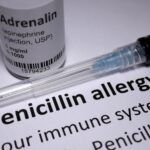List Of 20 Safe Antibiotics You Can Take If Allergic To Penicillin

Penicillin allergy is an allergic reaction to penicillin or antibiotics that have a similar chemical structure. Penicillin is one of the most commonly used antibiotics to treat bacterial infections such as strep throat, ear infections, and pneumonia. However, about 10% of people are allergic to penicillin, which can range from a mild rash to a severe, life-threatening reaction called anaphylaxis.
The immune system is responsible for protecting the body from foreign substances such as bacteria, viruses, and toxins. When someone is allergic to penicillin, their immune system identifies the drug as a harmful substance and produces antibodies to fight it off. This process triggers the release of chemicals such as histamine, which can cause allergic reactions.
Symptoms of a penicillin allergy can vary from person to person and can range from mild to severe. Mild symptoms include skin rash, hives, itching, and fever. In some cases, people may experience more severe symptoms such as swelling of the face, lips, tongue, or throat, difficulty breathing, and anaphylaxis.
Anaphylaxis is a severe, life-threatening allergic reaction that can occur within minutes or hours after exposure to penicillin. Symptoms of anaphylaxis include difficulty breathing, rapid heartbeat, drop in blood pressure, and loss of consciousness. Anaphylaxis requires immediate medical attention, and people who have experienced anaphylaxis in the past should carry an epinephrine auto-injector (such as an EpiPen) with them at all times.
If you suspect that you have a penicillin allergy, it is important to inform your healthcare provider of your allergy before they prescribe any antibiotics. Your healthcare provider may recommend alternative antibiotics or perform allergy testing to determine the specific cause of your allergy. In some cases, people may outgrow their penicillin allergy over time, but it is still important to inform healthcare providers of the allergy to prevent any potential adverse reactions.
List Of 20 Antibiotics You Can Take If Allergic To Penicillin
If you are allergic to penicillin, it is important to know that you may still be able to take other antibiotics to treat bacterial infections. There are many antibiotics available that do not belong to the same class of medications as penicillin and are therefore safe for people with a penicillin allergy. The following is a list of 20 antibiotics that are generally considered safe for people with a penicillin allergy:
1. Azithromycin
Azithromycin is a macrolide antibiotic that is often used to treat respiratory tract infections, skin infections, and sexually transmitted infections. It works by inhibiting bacterial protein synthesis. Azithromycin is generally considered safe for people with a penicillin allergy, although there may be rare cases of cross-reactivity.
2. Clarithromycin
Clarithromycin is another macrolide antibiotic that is often used to treat respiratory tract infections, skin infections, and sexually transmitted infections. It works by inhibiting bacterial protein synthesis. Clarithromycin is generally considered safe for people with a penicillin allergy, although there may be rare cases of cross-reactivity.
3. Erythromycin
Erythromycin is a macrolide antibiotic that is often used to treat respiratory tract infections, skin infections, and sexually transmitted infections. It works by inhibiting bacterial protein synthesis. Erythromycin is generally considered safe for people with a penicillin allergy, although there may be rare cases of cross-reactivity.
4. Doxycycline
Doxycycline is a tetracycline antibiotic that is often used to treat respiratory tract infections, skin infections, and sexually transmitted infections. It works by inhibiting bacterial protein synthesis. Doxycycline is generally considered safe for people with a penicillin allergy.
5. Minocycline
Minocycline is another tetracycline antibiotic that is often used to treat respiratory tract infections, skin infections, and sexually transmitted infections. It works by inhibiting bacterial protein synthesis. Minocycline is generally considered safe for people with a penicillin allergy.
6. Levofloxacin
Levofloxacin is a fluoroquinolone antibiotic that is often used to treat respiratory tract infections, urinary tract infections, and skin infections. It works by inhibiting bacterial DNA synthesis. Levofloxacin is generally considered safe for people with a penicillin allergy.
7. Ciprofloxacin
Ciprofloxacin is another fluoroquinolone antibiotic that is often used to treat respiratory tract infections, urinary tract infections, and skin infections. It works by inhibiting bacterial DNA synthesis. Ciprofloxacin is generally considered safe for people with a penicillin allergy.
8. Moxifloxacin
Moxifloxacin is a fluoroquinolone antibiotic that is often used to treat respiratory tract infections, sinusitis, and community-acquired pneumonia. It works by inhibiting bacterial DNA synthesis. Moxifloxacin is generally considered safe for people with a penicillin allergy.
9. Clindamycin
Clindamycin is a lincosamide antibiotic that is often used to treat skin infections, dental infections, and bone infections. It works by inhibiting bacterial protein synthesis. Clindamycin is generally considered safe for people with a penicillin allergy.
10. Linezolid
Linezolid is an oxazolidinone antibiotic that is often used to treat skin infections, pneumonia, and other bacterial infections. It works by inhibiting bacterial protein synthesis. Linezolid is generally considered safe for people with a penicillin allergy.
11. Vancomycin
Vancomycin is a glycopeptide antibiotic that is often used to treat bacterial infections such as MRSA, sepsis, and endocarditis. It works by inhibiting bacterial cell wall synthesis. Vancomycin is generally considered safe for people with a penicillin allergy.
12. Gentamicin
Gentamicin is an aminoglycoside antibiotic that is often used to treat severe bacterial infections such as sepsis and endocarditis. It works by inhibiting bacterial protein synthesis. Gentamicin is generally considered safe for people with a penicillin allergy.
13. Tobramycin
Tobramycin is another aminoglycoside antibiotic that is often used to treat severe bacterial infections such as sepsis and endocarditis. It works by inhibiting bacterial protein synthesis. Tobramycin is generally considered safe for people with a penicillin allergy.
14. Chloramphenicol
Chloramphenicol is a broad-spectrum antibiotic that is often used to treat meningitis, typhoid fever, and other serious bacterial infections. It works by inhibiting bacterial protein synthesis. Chloramphenicol is generally considered safe for people with a penicillin allergy.
15. Sulfamethoxazole/trimethoprim (Bactrim)
Sulfamethoxazole/trimethoprim, also known as Bactrim, is a combination antibiotic that is often used to treat urinary tract infections, respiratory tract infections, and skin infections. It works by inhibiting bacterial folic acid synthesis. Sulfamethoxazole/trimethoprim is generally considered safe for people with a penicillin allergy.
16. Nitrofurantoin
Nitrofurantoin is an antibiotic that is often used to treat urinary tract infections. It works by inhibiting bacterial DNA synthesis. Nitrofurantoin is generally considered safe for people with a penicillin allergy.
17. Metronidazole
Metronidazole is an antibiotic that is often used to treat infections caused by anaerobic bacteria and parasites. It works by inhibiting bacterial DNA synthesis. Metronidazole is generally considered safe for people with a penicillin allergy.
18. Fosfomycin
Fosfomycin is an antibiotic that is often used to treat urinary tract infections. It works by inhibiting bacterial cell wall synthesis. Fosfomycin is generally considered safe for people with a penicillin allergy.
19. Tigecycline
Tigecycline is a glycylcycline antibiotic that is often used to treat complicated skin infections and complicated intra-abdominal infections. It works by inhibiting bacterial protein synthesis. Tigecycline is generally considered safe for people with a penicillin allergy.
20. Daptomycin
Daptomycin is a lipopeptide antibiotic that is often used to treat skin infections and bloodstream infections caused by gram-positive bacteria. It works by disrupting bacterial cell membrane function. Daptomycin is generally considered safe for people with a penicillin allergy.
It is important to note that while these antibiotics are generally considered safe for people with a penicillin allergy, there may still be a small risk of cross-reactivity and allergic reactions. It is also important to discuss any previous allergic reactions with your healthcare provider before taking any medication and to report any new symptoms that may indicate an allergic reaction. In some cases, skin testing may be performed to determine if a person is allergic to penicillin or other beta-lactam antibiotics. Skin testing can help to identify which antibiotics are safe for the individual to take.





